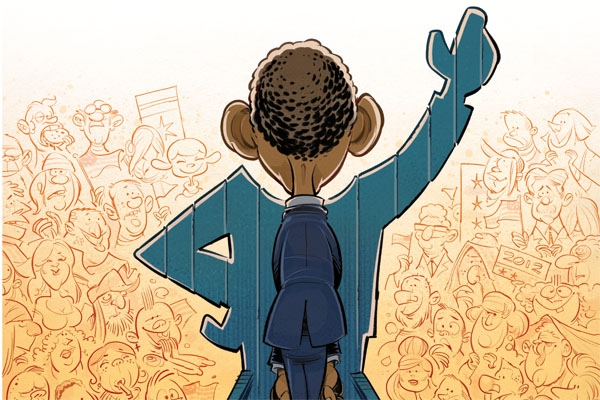London
Careening through the city in a minicab last night, en route to a pub in Bloomsbury that had promised to screen US election results, the mustachioed driver confirmed my accent and inquired: ‘So, what will happen after the elections?’
I issued the run-down: left-ish Democrats lose control of the Senate to right-ish Republicans, who also expand their House majority. The Republican gains won’t be enough to have too much fun (for instance, re-reforming health care) without meeting the President‘s veto pen; but should prove enough to justify more executive action from the White House, bypassing Congress in areas such as immigration and border control, if Mr Obama’s pre-election promises can be believed.
Yes, yes – the driver nodded and waved me along; a Bulgarian native with strong English, he was aware of the preliminaries. But what next?
Who knows, I told him. Washington did try the legislative route to immigration reform in 2010 – with a Democrat-controlled House and Senate, and measures to ease legalisation for the children of illegal immigrants. The bill died thanks in part to five Democrat senators who voted ‘no’. There’s also the matter that, by and large, Americans do not care about immigration nearly so much as do the grievance-mongers on all sides. Gallup’s latest ‘most important problem’ survey has a mere 7 per cent of US respondents ranking ‘immigration/illegal aliens’ as the most pressing issue of the day, after ‘economy in general’, ‘dissatisfaction with government’, ‘unemployment/jobs’ and ‘healthcare.’
Immigration is, however, the sort of ‘problem’ about which pundits and pols love to yammer; it makes for an instant campaign-issue: foreigners, the thinking goes, can be co-opted for votes as easily as they can be scapegoated – often and eventually, by the same politicians.
‘It’s going to be a long 25 months in America’, I summed up for the Bulgarian Londoner.
He nodded. ‘Yes, I see.’ After a pause, he offered that he’d chauffered another American over the weekend – a Washington resident, though not much of an insider, who was fretting that
‘Obama will try to spend and spend and spend, until there is a big fiscal crisis, and then use that as an excuse to make big new taxes on the rich.’
Sounds plausible, I replied, though voters would expect their new Republican senators to hinder that sort of thing. If they haven’t the wit or will, we speculated, where might top-marginal rates go under Obama Unleashed? A Brownian 50 per cent? A Hollandiste 75?
‘Sure, sure,’ the Bulgarian chortled. ‘Or maybe more than 100 per cent, like Sweden back when. Your Obama, you never know.’
Traffic seized as we headed north – a function of the Arsenal-Anderlecht match at Emirates. ‘This city…’ I grumbled. We rolled to a halt at a green light, just a few blocks from the pub. ‘It’s terrible, you can’t get anywhere in under 45 minutes here.’
The Bulgarian eyed me through his rearview mirror. ‘You don’t like it?’ He raised his brows and lowered his chin.
I shrugged and mumbled that I don’t dislike London more than any other big city, including my birth-town of New York. He grunted and turned his eyes back to the road.
We pulled up to the entrance. I payed, tipped and exited, as he advised:
‘You mustn’t complain, or else you should move somewhere else. The English already think they have too many foreigners here – you talk like that, and you make it worse for us all.’
Inside, I found my people: a clatch of Americans and hyphenates, with tagalong foreigners – a Chinese-American architect, someone from Nebraska, an Australian engineer, a Romanian lawyer, an Iranian-born neocon. So on.
The Arsenal match was still going – meaning the pub had yet to start screening the Fox News we’d been promised. My fellow white-collar immigrants did not share the Bulgarian driver’s no-grumbling policy.
By the time the pub TV switched from football to elections, we were a mere hour from last call, and polls had barely closed in the eastern states. Virginia would be too close to call until morning in London; while Colorado was still hours from closing its polls.
‘I’m not nearly finished my beer yet!’ piped the Romanian lawyer, 15 minutes after the pub had rung its second bell.
‘I’m sorry if you haven’t been in this country long enough to know,’ replied the bar-maid in a North London twang, ‘but that second bell means drink up and get out.’ And out we got.
Got power? Join The Spectator for an insider-fueled global energy conference on 1 December. Tickets are still available here.






Comments